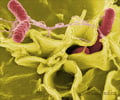A vaccination campaign to combat rotavirus in the world's poorest countries could save the lives of many children, according to a pair of studies published this week.
A vaccination campaign to combat rotavirus in the world's poorest countries could save the lives of many children, according to a pair of studies published this week.
Around the world, more than half a million infants and children die each year from rotavirus infection, a leading cause of severe diarrhoea in children under the age of five, with more than half of the reported cases in sub-Saharan Africa.The studies published in this week's New England Journal of Medicine found that vaccination campaigns in Malawi and South Africa reduced the rate of rotavirus infections by 61.2 percent during the first year of life, while another campaign in Mexico saw diarrhoeal disease rates drop by over 65 percent.
In industrialized countries, the vaccine is part of a standard paediatric immunization protocol.
"We now have another powerful weapon to add to our armamentarium to combat diarrhoeal deaths -- rotavirus vaccines," John Hopkins University health professor Mathuram Santosham wrote in an editorial accompanying the studies' results.
"Rotavirus vaccine should be introduced immediately in high mortality areas and it should be used as a trigger to energize diarrhoea control programs and improve coverage for all the proven interventions for diarrhoea."
More than 4,900 infants were enrolled in the Phase III clinical trial in Malawi and South Africa testing the Rotarix rotavirus vaccine, which is developed by British pharmaceutical group GlaxoSmithKline Biologicals.
Advertisement
The Mexico study looked at the impact of vaccination on diarrhoeal deaths in Mexican children between 2008 and 2009 after a phased introduction of the orally administered Rotarix vaccine.
Advertisement
"The vaccine can make a significant impact in global public health if investments are made to bring them to all children, particularly those in the world's poorest countries," added Madhi, co-director of the South African Medical Research Council at the University of Witwatersrand in Johannesburg.
Source-AFP
THK









